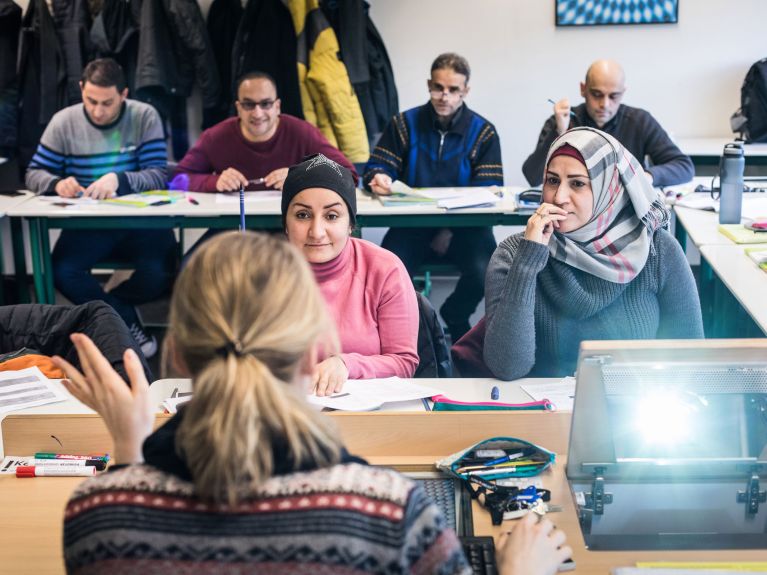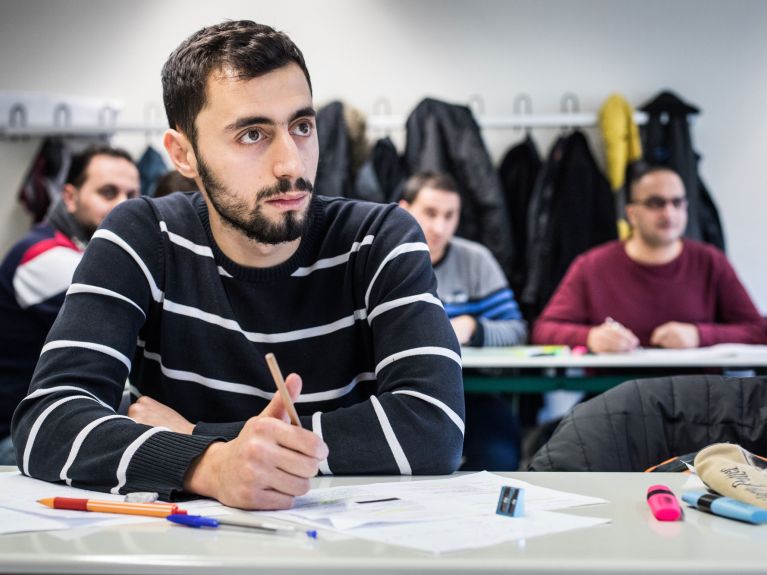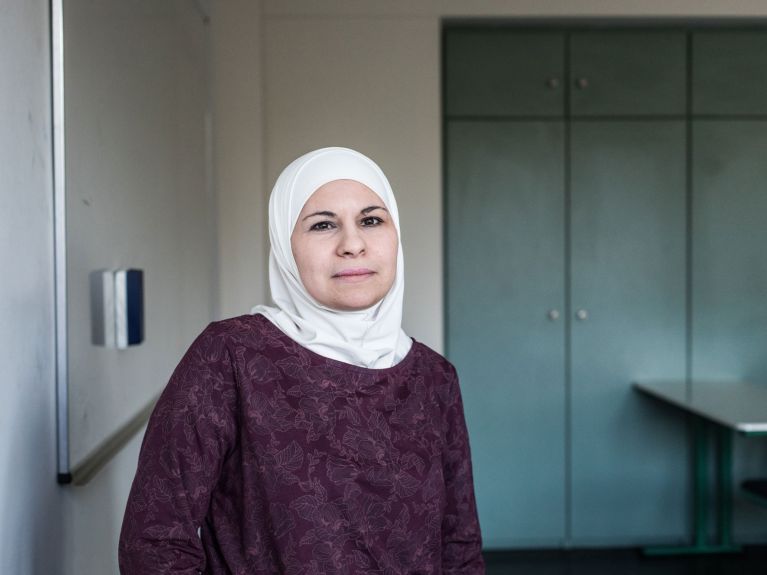From conflict to classroom
They were experienced teachers in Syria or other crisis countries, but then they had to flee. They would like to teach again in Germany. But that isn’t easy.

Germany. Today’s seminar focuses on the computer as a teaching aid. “The computer has a large storage capacity and” – the young man hesitates, moves his finger across his sheet – “enables virtual study plates.” The teacher corrects him: “study platforms”. Some of the other students take notes before they move on to the next text. The atmosphere is one of total concentration.
The prospect of a job as assistant teacher
You need to be highly motivated to keep up with the work in the Refugee Teachers Program at the University of Potsdam. After all, the pilot project funded by the Brandenburg Ministry of Education and the German Academic Exchange Service (DAAD) has a rather ambitious goal: it aims to prepare refugees who worked as teachers for a long time in their home countries to teach in German schools – in just one and a half years. To achieve that they have to study for at least four hours a day: grammar, specialist vocabulary and education. Sometimes they sit in courses with German-speaking student teachers, sometimes in their own groups. Participants who pass the exam at the end of the programme will receive a job for two years as an assistant teacher in the State of Brandenburg.
Dieses YouTube-Video kann in einem neuen Tab abgespielt werden
YouTube öffnenThird party content
We use YouTube to embed content that may collect data about your activity. Please review the details and accept the service to see this content.
Open consent form“There has never been anything comparable before,” says Miriam Vock, the professor of empirical teaching and intervention research at the University of Potsdam who developed the programme. However, the standards expected of teachers in Germany are high. A great deal has been learnt since the project was launched in April 2016. Initially the training programme was set up for one year – far too little time to begin such a demanding job in a foreign country. That’s why the programme now runs six months longer. Nevertheless, not all participants manage to pass the language exam at C1 Level the first time, and this is the standard required for a position as assistant teacher. Several participants have to retake the test.
Positive points of contact for refugee students
Nonetheless, the successes speak for themselves: in the meantime, a fourth group is already preparing for the teaching profession in Germany, including a period of practical school training lasting several months. “This is working well for both sides – not only the participants, but also the schools,” says Vock. The presence of refugee teachers facilitates the integration of students who have had similar experiences.
It is important to give a chance to the many highly qualified teachers among the refugees.
The successful graduates of the first year group are already working as assistant teachers. After two years they should receive full teacher status. Demand is great because many places in Germany are experiencing teacher shortages, especially in specific subjects. Furthermore, in five years’ time there will be some 293,000 school students with migrant backgrounds in Brandenburg alone, the local Ministry of Education has calculated. It is therefore very likely that the Refugee Teachers Program will be continued. Another similar programme has already been established: Bielefeld University launched the Lehrkräfte Plus initiative with the support of the Bertelsmann Foundation. Miriam Vock hopes other universities will follow suit. “It is important to give a chance to the many highly qualified teachers among the refugees.”

Two participants in the Refugee Teachers Program report on there experiences here:
Wahida Alomar, 33 years old

On this cold February day it is exactly two years since Wahida Alomar arrived in Germany. Before that she had taught at a primary school in Aleppo for twelve years. She fled Syria in 2016. “In January 2016 I was still working there,” explains the 33-year-old teacher. “Then a bomber flew over the school; one of the principal’s children died.”
Teaching has always been my dream profession.
Alomar is glad to be in Potsdam now. During her first language course in Germany a teacher recommended she apply for the Refugee Teachers Program, which she has now almost completed. Alomar can hardly wait to become an assistant teacher, but she is also a little anxious about what comes after that. She hopes very much that she successfully makes the grade. “Teaching,” she says, “has always been my dream profession.” However, there are often differences in how children and teachers interact in Germany. In Syria, for example, it would be unusual for a student to sit in a lesson with crossed arms and not answer a teacher’s questions, says Alomar and laughs. In the Refugee Teachers Program, however, she has learned a lot from German student teachers about how to deal with disruptive children.
Lina Alkhalaf, 32 years old

Finally being able to teach again is also the wish of Lina Alkhalaf, who comes from Syria’s capital, Damascus. There she taught mathematics, chemistry and physics at senior high school level for nine years. Although Alkhalaf only began learning German one and a half years ago you can hear just the slight trace of an accent when the 32 year old talks about the differences between the school systems in her old and new homes.
The students were very nice and open during my period of practical training – I learned a lot from them.
“In Syria the classes at high school are much larger with 35 to 40 students. And the students cannot opt out of subjects.” Alkhalaf enthuses about how there are many more technical aids and study materials available in German schools. And the students were always very nice and open during her period of practical training – “I learned a lot from them”. Alkhalaf also wonders about what will happen after her two years as assistant teacher. “If things don’t work out as a teacher I could go into research as a physicist.”

